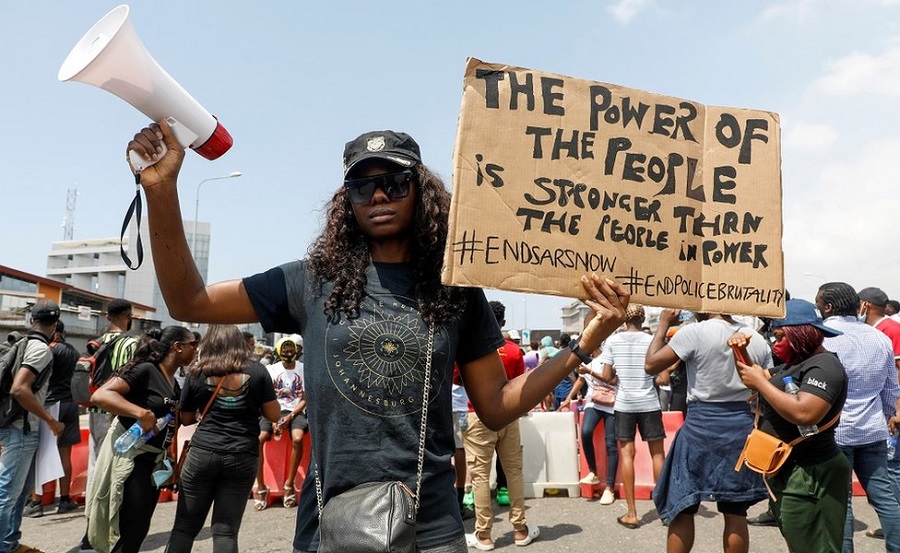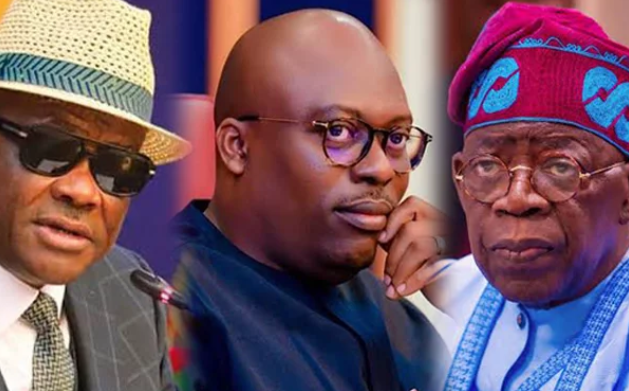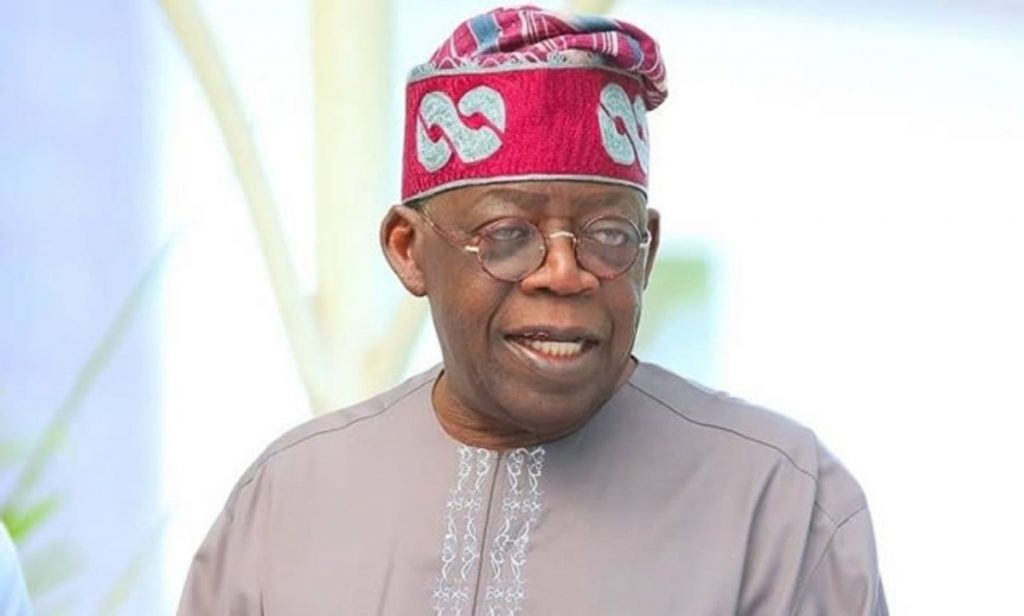By Dolapo Aina
First things first, writing about politics, its abracadabra, its luggage and attendant baggage is not what I do (as one left that forte years ago.) And the primary reason for not writing about Nigerian, African or global politics is that as any noteworthy writer and strategic thinker who is worth his or her salt would attest to, you see and can connect the dots long before the citizenry understand what politicians are cooking, serving and dishing out to them. Basically put, writing about politics is not usually intellectually engaging because it is usually déjà vu (if you know or have read the history of the particular context and subject matter). But there are exceptions to the rule where a writer sees patterns others might not have seen and would have to highlight it. The endsars is one of such cases.
Every Nigerian who was following the endsars’ protests from the first week of October 2020 knew where he or she was on the evening of Tuesday, October 20, 2020 and still remembers what he or she saw and heard on some people’s livestreams and DJ Switch’s Instagram livestream. Rehashing the images that emanated from the livestream of DJ Switch would be re-opening mental and psychological wounds that have not healed for those who survived the ordeal at Lekki tollgate, those who barely survived, the families of those whose loved ones have not been found i.e., no closure and those who watched the horror online. Everyone (probably without knowing it) is still going through a post-traumatic stress disorder PTSD which I would get back to shortly.
The ramifications of what happened that night (which one would think was a movie shot by African American movie director Antoine Fuqua who is known for his detailed hyper action movies) morphed from online to reality and is not lost on anyone, as any Nigerian who met Nigerians outside Nigeria might have noticed and deduced. The Nigerians who were in the country and especially Lagos and the island on that day, who I have met outside Nigeria, always seem to have an interesting feature, something in the mould of a PTSD-infused dejection about the country which you cannot miss. The number of Nigerians one met outside Nigeria shortly after October 2020 was on the high side as it would appear that those who could afford it stepped or flew outside Nigeria for breath of fresh air to recalibrate from the turmoil that engulfed the country and most importantly, to re-evaluate their professional and personal options vis-à-vis an enabling environment which was not what they left behind and many attested to this.
Migration and brain drain are not new phenomena for it is as old as the Biblical times. But in the 21st Century where anywhere on any continent can become home if several factors are in place notably, an enabling environment deliberately engineered by forward thinking governments, people would readily move or relocate. And one major outcome of the endsars protests and Lekki massacre has been the obvious migration of upwardly mobile Nigerians (in this particular instance, I am focusing on those with high skillsets and human capital). I have lost count of how many, one has met outside Nigeria and the final trigger for this head-scratching migration of highly skilled category and demography was and still is October 20, 2020.
Now, according to Wikipedia, a remittance is a non-commercial transfer of money by a foreign worker, a member of a diaspora community, or a citizen with familial ties abroad, for household income in their home country or homeland. Money sent home by migrants competes with international aid as one of the largest financial inflows to developing countries. Workers’ remittances are a significant part of international capital flows, especially with regard to labour-exporting countries. According to the World Bank, in 2018 overall global remittance grew 10% to US$689 billion, including US$528 billion to developing countries. Overall global remittance is expected to grow 3.7% to US$715 billion in 2019, including US$549 billion to developing nations.
Due to its large Diaspora and overseas expats population, India consecutively remains the top receiver of remittance, e.g. with US$80 billion in 2018, US$65.3 billion (2.7% of India’s GDP) in 2017, US$62.7 billion in 2016 and US$70 billion in 2014. Other top recipients in 2020 were US$67 billion to China, US$34 billion each to Philippines and Mexico and US$26 billion to Egypt.
Now, Diaspora is the dispersion or spread of any people from their original homeland. It also means to scatter about. Furthermore, the term diaspora comes from an ancient Greek word meaning “to scatter about.” And that’s exactly what the people of a diaspora do. They scatter from their homeland to places across the globe, spreading their culture as they go. Cambridge Dictionary states that Diaspora is a group of people who spread from one original country to other countries.
The Bible refers to the Diaspora of Jews exiled from Israel by the Babylonians. Jews living outside Israel; the dispersion of the Jews beyond Israel. The main diaspora began in the 8th–6th centuries BC.
In a piece written by Adolphus Aletor in the Guardian Nigeria newspaper of Monday, October 18, 2021, titled; “Enough of Nigeria’s Dependence on Diaspora Remittances”, he stated that; “Early this year 2021, the World Bank reported that diaspora remittance in Nigeria for the year 2020 fell to $17bn from $23 in 2019. Analysts attributed the use of alternative platforms powered by blockchain technology, partly, as a reason for the reduction. Since then, the Federal Government has taken steps not only to stabilise the Naira but increase diaspora remittances.”
He furthered stated that, “In 2018, Nigerians abroad sent a total of $25billion representing about 6.1% of Gross Domestic Product that year which made Nigeria second in Africa after Egypt with $28billion. However, recent reports from the World Bank show that in 2019, it dropped to $23.81billion and in 2020, to $17.21billion representing four per cent of Nigeria’s Gross Domestic Product in 2020. In 2020, total international migrants were estimated to be 281million people, that is, 3.6% of the world population out of which about 15 million is touted to be Nigerians. In 2017 alone, about 1.3 million people left Nigeria.”
He stated that, “In 2020, the following five countries came tops globally for remittances inflow; India (83 billion), China (60 billion), Mexico (43 billion), the Philippines (35 billion), and Egypt (30 billion). India has occupied the top position since 2008. According to the World Bank, the decline in inflows to Sub-Saharan Africa was mostly due to a 28 per cent decline in remittance flows to Nigeria. Excluding flows to Nigeria, remittances to Sub-Saharan Africa increased by 2.3%, demonstrating resilience.”
Whilst these figures might cause dizziness, one crystal clear and immaculate truth is that countries appreciate and place high value to diaspora remittances. But this is not where this piece is leading you to. Hold onto your seat belts.
One ramification which isn’t being focused on is that even though a large diaspora community means more remittances back home to a country and more remittances mean more foreign exchange to stimulate an economy, the bigger problem isn’t yet a talking point. Stay with me.
With the events of October 20, 2020 still fresh and still playing in people’s hearts and minds. With the diplomatic placements of some of the main actors of October 2020 and knowing that the international implications of October 20, 2020 would begin to play out in 2023 (after this current administration); what is slowing playing out from the outside is that the diaspora who have the skillsets, human capital and global connections and networks are beginning to migrate their global connections to where the environments are conducive and friendly. In essence, the diaspora who have connections which can translate into foreign direct investments (FDIs) for their ancestral country are moving such potential investors to other peaceful environments and climes. In simple English, FDIs typically need and trust someone or people who is/who are from a certain country or continent and who can give in-depth knowledge about what to do and what not to do. Now, imagine that the diaspora with such high net-worth FDIs, would they member of the diaspora take the FDIs to a place where the system would discredit and tarnish his or her standing credibility which must have been meticulously garnered and painstakingly built for several years? Succinctly put, foreign direct investments (FDIs) supersede diaspora remittances.
Now, here is the real and mighty elephant in the ceramic shop. Anyone who has been observant would realise that for close to a year since 2020 and recently, news items on Nigerian tech start ups are all there for all to read, assimilate and think about. And more of such news would keep on beating into the recollective skulls and eardrums of forward-thinking policy makers on the African Continent and globally in 2022 and beyond. But, October 2020 in Nigeria, was akin to a flick (only that the events were real) shot by Antoine Fuqua but the mindset of diaspora with FDIs’ connections is akin to a Quentin Tarantino TV Series which would stretch way beyond the elections of 2023. Something did happen; something did snap on Tuesday, October 20, 2020 and it finally broke upwardly mobile Nigerians vis-à-vis the meaning of wholehearted patriotism (for more than a decade I have come to the conclusion that patriotism in several countries is a song sung by politicians to their citizens only. But when push comes to shove, the politicians would hum a different hymn and sing a new song.) The evidence can be seen and felt from the outside when you have a Nigerian themed discussion or chitchat with Nigerians or people of Nigerian descent. So, what is the solution? It is to engage in civic responsibilities and politics way before elections begin, so as to elect those who would genuinely serve their respective localities and the citizenry in general.
Again, but something snapped and shifted on that dreadful night of Tuesday, October 20, 2020. The Nigerian Diaspora is taking their potential direct foreign investors elsewhere (for there is a lot at stake, credibility being one of the major factors), to where there is an enabling environment and where there is peace of mind. Present-day pragmatism (you might say). It is what it is.
Dolapo Aina writes from Kigali, Rwanda

 News6 years ago
News6 years ago
 Featured6 years ago
Featured6 years ago
 Boss Picks6 years ago
Boss Picks6 years ago
 Headline6 years ago
Headline6 years ago
 Headline6 years ago
Headline6 years ago
 Headline5 years ago
Headline5 years ago
 Headline6 years ago
Headline6 years ago
 Headline6 years ago
Headline6 years ago














